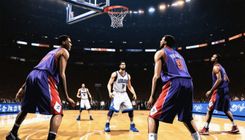2025 NBA Awards Season: Winners, Losers, and Financial Implications

With the conclusion of the NBA's award season following the announcement of the All-NBA and All-Defensive teams, a clearer picture of the league's standout performers emerges for 2025. The identification of award winners and those who fell short reveals a broader narrative beyond simple accolades, impacting the futures of various teams and players, particularly in terms of financial considerations.
The selections for the awards included impressive names. The All-Rookie First Team featured Stephon Castle, Zaccharie Risacher, Jaylen Wells, Zach Edey, and Alex Sarr, while the Second Team included Matas Buzelis, Bub Carrington, Donovan Clingan, Kel’el Ware, and Yves Missi. The All-Defense First Team consisted of Evan Mobley, Draymond Green, Dyson Daniels, Lu Dort, and Amen Thompson, with the Second Team including Toumani Camara, Rudy Gobert, Jaren Jackson Jr., Jalen Williams, and Ivica Zubac. For the All-NBA teams, the First Team recognized Shai Gilgeous-Alexander, Nikola Jokić, Giannis Antetokounmpo, Jayson Tatum, and Donovan Mitchell, while the Second Team acknowledged Jalen Brunson, Stephen Curry, Anthony Edwards, LeBron James, and Evan Mobley. The Third Team was comprised of Cade Cunningham, Tyrese Haliburton, James Harden, Karl-Anthony Towns, and Jalen Williams.
Historically, MVP discussions have often been oversimplified to the premise of identifying the best player on the best team. This approach, while effective in some seasons, can fail to accurately capture the intricacies of individual performance. For the 2024-25 season, such a stance could reinforce the narrative surrounding the Oklahoma City Thunder, who set several records, including all-time single-season point differential, double-digit wins, and 15-point victories. Shai Gilgeous-Alexander's exceptional individual plus-minus of 918 ranks fifth in NBA history, trailing only notable seasons from Stephen Curry and Draymond Green. He also led the league in estimated plus-minus and total points scored, underscoring his exceptional contribution to the Thunder’s success. His MVP win, however, invites further scrutiny into the debate on the characterization of 'best' versus 'most valuable', with many discussions failing to explore the depth of this distinction.
Notably, while Jokić's triple-double averages and his contributions to the Denver Nuggets' success remain prominent factors, the debate surrounding MVP eligibility invites additional considerations. Questions surrounding player impact, roster construction, and historical precedents deserve a thorough examination, revealing that the complexity of the award is often overlooked. Therefore, MVP candidates should be evaluated based on a multitude of performance metrics and team context rather than a singular narrative.
The MVP debate exemplified the nature of diverging questions within the league, with strong arguments present for both Jokić and Gilgeous-Alexander. Ultimately, the subjective nature of these discussions underscores the rich talent present in the NBA. As Evan Mobley secured the Defensive Player of the Year award, debates continue regarding the validity of the results across various categories. Mobley’s defensive presence was pivotal for the Cleveland Cavaliers, yet his defensive estimated plus-minus indicated a close competition with other esteemed players like Dyson Daniels, who recorded the highest steals per game in over three decades, and Draymond Green, fundamental to the Warriors' defensive strategy post-trade deadline.
Clutch Player of the Year and Most Improved Player categories reflect similar complexities, revealing how different evaluative criteria might yield distinct outcomes. The subjective nature of these awards brings to light the depth of talent in the current NBA landscape, presenting myriad worthy candidates across all categories. This competitive environment, while fostering rigorous debates, ultimately enhances the experience for fans.
The collective bargaining agreement in the NBA has significant implications for player salaries, closely tying individual honors to compensation structures. Winning accolades such as Defensive Player of the Year or earning All-NBA distinctions can dramatically alter a player's contractual potential. Following his award, Mobley is positioned to secure a substantial salary increase, transitioning from a projected '25 percent of the cap' salary of $38.7 million for the 2025-26 season to '30 percent of the cap', amounting to approximately $46.4 million. As a result, Mobley’s financial trajectory significantly improves, though it also creates potential challenges for team-building within the Cavaliers’ roster.
In contrast, Cade Cunningham's Third Team All-NBA status yields a similar upward adjustment in contract potential, providing an advantage for the Detroit Pistons. With limited competing contracts on their roster, Detroit's financial flexibility remains favorable when considering Cunningham's anticipated salary increase. Conversely, notable players missing out on All-NBA selections, including Jaren Jackson Jr., Scottie Barnes, and Franz Wagner, will face limitations on their potential earnings, with Jackson missing eligibility for a supermax extension affecting his financial outlook. The complexity of contract negotiations and roster dynamics illustrates the broader impacts of these individual honors, as teams aim to balance their books while fielding competitive squads.
Further magnifying these financial implications is Shai Gilgeous-Alexander's MVP award; he stands poised to enter into a record-breaking five-year, $380 million contract next summer. The contractual framework underscores a shifting era within the league, where individual performances and honors increasingly dictate salary structures. As he continues his impressive on-court presence, Gilgeous-Alexander exemplifies the evolving landscape of player contracts and the financial realities they engender.









